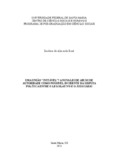| dc.creator | Real, Isadora de Almeida | |
| dc.date.accessioned | 2021-12-07T13:59:57Z | |
| dc.date.available | 2021-12-07T13:59:57Z | |
| dc.date.issued | 2021-07-15 | |
| dc.identifier.uri | http://repositorio.ufsm.br/handle/1/23179 | |
| dc.description.abstract | This paper aims to examine the particular political dispute between the Federal Parliament and
the Organs of the Brazilian judicial system, based on the analysis of the new Law of Abuse of
Authority. At two different times in national political life, laws were passed with the scope of
disciplining authorities' abuses in Brazil: in the second year of the Military Regime (Law No.
4,898, of December 9, 1965) and in 2019 (Law No. 13,869, of 05 Sep.2019), 31 years after the
promulgation of the 1988 Constitution. Considering the two distinct contexts – the first, of an
authoritarian nature; the second, of a democratic nature –, it is deduced that the relationship
between the Powers is different: prevalence of the Executive Power in the first case; of the
Legislative, in the second. With an analytical-descriptive approach, the purpose of this work
will be to demonstrate, from the review of the law, that there was a political judgment in its
surroundings. The main conclusion was that the Legislative Branch, ultimately – given the
relationship between the branches – took advantage in terms of the prevalence of its interests. | eng |
| dc.language | por | por |
| dc.publisher | Universidade Federal de Santa Maria | por |
| dc.rights | Attribution-NonCommercial-NoDerivatives 4.0 International | * |
| dc.rights.uri | http://creativecommons.org/licenses/by-nc-nd/4.0/ | * |
| dc.subject | Abuso de autoridade | por |
| dc.subject | Disputa política | por |
| dc.subject | Poder legislativo | por |
| dc.subject | Poder judiciário | por |
| dc.subject | Abuse of authority | eng |
| dc.subject | Political dispute | eng |
| dc.subject | Legislative power | eng |
| dc.subject | Judicial power | eng |
| dc.title | Uma união “instável”? A nova lei de abuso de autoridade como possível incidente da disputa política entre os poderes legislativo e judiciário | por |
| dc.title.alternative | An “unstable” union? The new authority abuse law as a possible incident of the political dispute between legislative and judiciary | eng |
| dc.type | Dissertação | por |
| dc.description.resumo | Este trabalho tem como objetivo o exame da particular disputa política entre o Parlamento
Federal e os Órgãos do sistema judicial brasileiro, a partir da análise da nova Lei de Abuso de
Autoridade. Em dois momentos distintos da vida política nacional, foram aprovadas leis com o
escopo de disciplinar abusos de autoridades no Brasil: no segundo ano do Regime Militar (Lei
nº. 4.898, de 09 dez.1965) e em 2019 (Lei nº. 13.869, de 05 set.2019), 31 anos após a
promulgação da Carta Magna de 1988. Considerando-se os dois contextos diferentes – o
primeiro, de feição autoritária; o segundo, de feitio democrático –, deduz-se que a relação entre
os Poderes seja distinta: prevalência do Poder Executivo, no primeiro caso, e do Legislativo,
no segundo. Com um approach analítico-descritivo, o propósito deste trabalho será demonstrar,
a partir do reexame da lei, que houve um juízo político em seu entorno. A principal conclusão
foi a de que o Poder Legislativo, em última instância – dada a relação entre os poderes –, levou
vantagem no que se refere ao prevalecimento de seus interesses. | por |
| dc.contributor.advisor1 | Perez, Reginaldo Teixeira | |
| dc.contributor.advisor1Lattes | http://lattes.cnpq.br/1378204180017338 | por |
| dc.contributor.referee1 | Maia , Eduardo Lopes Cabral | |
| dc.contributor.referee2 | Grohmann, Luis Gustavo Mello | |
| dc.creator.Lattes | http://lattes.cnpq.br/2686648838569474 | por |
| dc.publisher.country | Brasil | por |
| dc.publisher.department | Sociologia | por |
| dc.publisher.initials | UFSM | por |
| dc.publisher.program | Programa de Pós-Graduação em Ciências Sociais | por |
| dc.subject.cnpq | CNPQ::CIENCIAS HUMANAS::SOCIOLOGIA | por |
| dc.publisher.unidade | Centro de Ciências Sociais e Humanas | por |



